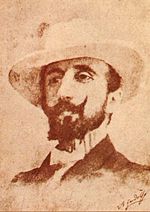Nino Martoglio, Date of Birth, Place of Birth, Date of Death
TweetNino Martoglio
Italian writer
 Date of Birth: 03-Dec-1870
Date of Birth: 03-Dec-1870
 Place of Birth: Belpasso, Sicily, Italy
Place of Birth: Belpasso, Sicily, Italy
Date of Death: 15-Sep-1921
Profession: screenwriter, writer, poet, playwright, journalist, film producer, film editor
Zodiac Sign: Sagittarius 
About Nino Martoglio
- Nino Martoglio (Belpasso, Paternò, 3 December 1870 — Catania, 15 September 1921) was an Italian writer, publisher, journalist and producer of theatrical works.
- He wrote mostly in Sicilian and likewise, his theatrical works were mostly in Sicilian.
- He founded a theatre company in Catania in the early part of the 20th century.
- In the latter stages of his life he had some success as a film director. From 1889 to 1904 he published a weekly magazine called D'Artagnan.
- It represents one of the very few periodicals ever to have been published in Sicilian to enjoy prolonged success.
- Its content included art, literature, theatre and politics, or more accurately, political satire. In terms of the Sicilian language, Martoglio is an important figure in the establishment of Sicilian as an acceptable literary language. His magazine also played a role in discovering such leading Italian illustrators as Giovanni Grasso and Angelo Musco.
- His theatre company debuted the works of renowned dramatists such as Pier Maria Rosso di San Secondo and the Nobel prize winner, Luigi Pirandello.
- He founded the Compagnia drammatica siciliana in 1903. From 1913 to 1915 he started directing movies.
- He enjoyed some success with Teresa Raquin and Sperduti nel buio.
- In 1919 he founded the Compagnia Drammatica del Teatro Mediterraneo.
- Martoglio’s films are among a small core of films that constitute the realismo movement, which later inspired neorealism.
- In the 1930s, film critic and teacher Umberto Barbaro exalted Sperduti nel buio in his essays, and showed it in his classes at Centro Sperimentale di Cinematografia in Rome.
- These classes were attended by Roberto Rossellini and Luchino Visconti, who would become instrumental in defining the neorealism film movement after the Second World War. His best known theatrical works, which enjoyed success throughout Italy, include Nica (from 1903), L’aria del Continente (from 1915), and San Giuvanni Decollato from 1908. His most important literary work is Centona, a collection of poetry published in 1899.
Read more at Wikipedia
See Also
- Famous People's Birthdays on 03 December, Italy
- Famous People's Birthdays in December, Italy
- Famous screenwriter's Birthdays on 03 December, Italy
- Famous screenwriter's Birthdays in December, Italy
- Famous writer's Birthdays on 03 December, Italy
- Famous writer's Birthdays in December, Italy
- Famous poet's Birthdays on 03 December, Italy
- Famous poet's Birthdays in December, Italy
- Famous playwright's Birthdays on 03 December, Italy
- Famous playwright's Birthdays in December, Italy
- Famous journalist's Birthdays on 03 December, Italy
- Famous journalist's Birthdays in December, Italy
- Famous film producer's Birthdays on 03 December, Italy
- Famous film producer's Birthdays in December, Italy
- Famous film editor's Birthdays on 03 December, Italy
- Famous film editor's Birthdays in December, Italy

